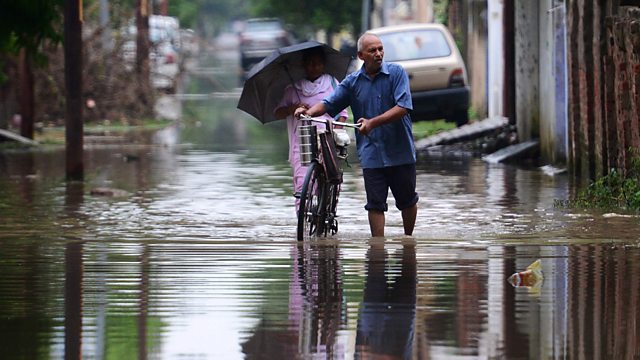
Monsoon Floods
Monsoons; Epilepsy seizure device; Stroke checklist; Landslides; Wales’ Ecology; Cramping
Why is the monsoon experienced in Kerala in South West India so wet? The monsoon is a combined meteorological event, where several factors - altered low pressure systems in the Bay of Bengal, altered winds and a warmer ocean - interacted to deliver devastating rainfall. Is this extreme weather event a symptom of our changing climate? Roland Pease talks to Dr Roxy Mathew Koll who is a climate scientist of the Indian Institute of Tropical Meteorology, and a visiting researcher at the USA’s National Oceanic and Atmospheric Administration.
Epilepsy Seizure Device
Scientists have shown how an electronic gadget, implanted in the brain, can detect, treat and even prevent epileptic seizures. Epilepsy is usually treated using anti-epilepsy drugs, but can cause serious side-effects. Researchers at the University of Cambridge are aiming to create something more specific to the part of the brain associated with the problem. Professor George Malliaras tells Marnie Chesterton about the unique properties of this new implant, which could be used for a range of brain-related conditions from Parkinson’s tremors to brain tumours.
Stroke Checklist
Only 10-20% of strokes are caused by a ruptured blood vessel – instead of a blood clot – but this type is deadly, causing 40% of stroke deaths. A brain scan is used to tell which type of stroke a patient has had – and treatment is given to those with clots. There is currently no treatment for patients with a bleed on the brain – but now researchers in Edinburgh have worked out a simple checklist to predict which patients will recover – and which need close monitoring in case they bleed again. Claudia Hammond spoke to Professor Rustam Al-Shahi Salman, Professor of Clinical Neurology at the University of Edinburgh and lead author of a paper published in the Lancet.
Human Triggers for Landslides
Analysis of a global dataset on landslides has shown that the occurrence of landslides triggered by human activity is increasing. The dataset will continue to be built by scientists and members of the public over the next decades, allowing us to ask whether there is link between the occurrence of landslides and our changing climate. Roland Pease spoke to Dr Melanie Froude from the University of Sheffield.
Llyn Brianne Observatory
Many of Britain’s cleaner urban rivers are home to levels of biodiversity not seen for decades. But rural rivers, even in places without pollution, tell a different story. Up in the hills of central Wales just north of the Brecon Beacons, lies the Llyn Brianne Observatory and its surrounding system of beautiful streams. Professor Steve Ormerod from Cardiff University speaks to Marnie Chesterton about the dwindling number of specialist invertebrates and the subtle ways the decline is happening, which points to an extinction crisis that has gone unnoticed.
Cramps
Do you suffer from cramps when you are asleep? Australian reporter Cassandra Steeth investigates the science behind cramping.
(Picture: Indian residents wade along a waterlogged street after heavy rains - Credit: AFP/Getty Images)
The Science Hour was presented by Marnie Chesterton with comments from science journalist and editor at the Economist Jason Palmer
Producer: Katy Takatsuki
Last on
More episodes
Previous
Broadcast
- Sat 1 Sep 2018 11:06GMT���˿��� World Service Americas and the Caribbean
Podcast
-
![]()
Unexpected Elements
The news you know, the science you don't

